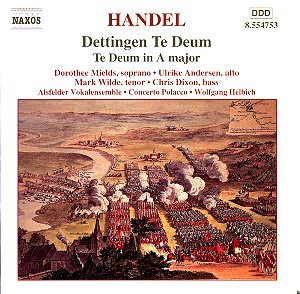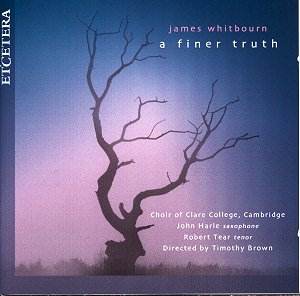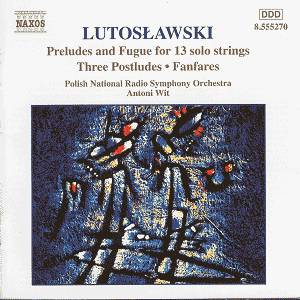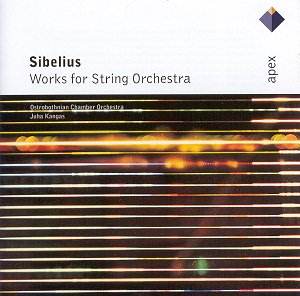 Composer: George Frideric Handel
Composer: George Frideric Handel
Works: Te Deum in D major, HWV 283; Te Deum in A major, HWV 282
Performers: Dorothee Mields (soprano), Ulrike Andersen (alto), Mark Wilde (tenor), Chris Dixon (bass), Alsfelder Vokalensemble, Concerto Polacco
Recording: Conducted by Wolfgang Helbich; recorded in Maria Magdalenen Kirche, Templin, Germany, 12-16 August 1999
Label: NAXOS
Handel’s Te Deums, though not as frequently performed as his oratorios, provide a fascinating insight into his liturgical writing and celebratory spirit, particularly when viewed through the lens of their historical contexts. The Te Deum in D major was composed in 1743 to commemorate King George II’s victory at the Battle of Dettingen. This composition reflects the grandeur and martial triumph, characterized by its vibrant orchestration that incorporates festive trumpets and drums. The companion piece, the Te Deum in A major, offers a distinct contrast, being more intimate and derived from earlier works commissioned by the Duke of Chandos. Together, these pieces reveal Handel’s versatility and the evolution of his choral style.
The performance under Wolfgang Helbich showcases engaging vitality, particularly in the D major Te Deum. The Alsfelder Vokalensemble, with its youthful sound and commendable tuning, brings energy to the work’s jubilant sections. The choir’s response to Handel’s varied moods—shifting from celebratory exclamations to reflective passages—is adeptly captured. Notably, the bass soloist Chris Dixon stands out; his resonant timbre and clear diction enhance the text’s meaning, particularly in the deeply expressive “Make them to be numbered with Thy saints.” The soprano Dorothee Mields delivers a poised interpretation in “To Thee all angels cry aloud,” though her tendency to swell sustained notes may distract from the overall clarity. The tenor Mark Wilde performs competently, yet the alto’s English pronunciation lacks the precision expected in such a distinguished work, which slightly undermines the choral coherence.
The orchestral contribution by Concerto Polacco, while spirited, reveals some unevenness. The strings occasionally lack the polish necessary for Handel’s intricate passages, resulting in a less cohesive sound than one might find in more polished renditions. This is particularly evident in the orchestral interludes where tighter ensemble work would enhance the overall impact. In the A major Te Deum, the inclusion of wind instruments like the bassoon and flute adds an appealing richness, and Helbich’s direction allows these colors to emerge. The performance is, however, not without its strengths; the sensitive dynamics and articulation in the smaller ensemble setting of the A major Te Deum are commendable, reflecting Handel’s nuanced writing for a more intimate context.
The recording quality is satisfactory, capturing the essence of the live performance within the resonant space of the Maria Magdalenen Kirche. The balance between choir and orchestra is generally well managed, though the orchestral detailing could benefit from a bit more clarity. While this recording does not quite reach the heights of renowned interpretations, such as those by Simon Preston, it offers a valuable opportunity to explore these lesser-known works of Handel, which are often overshadowed by his more famous compositions.
This Naxos release provides an engaging and accessible entry into Handel’s Te Deums, showcasing both the celebratory spirit of the D major work and the reflective intimacy of the A major setting. While there are areas for improvement, particularly in the orchestral execution and soloist consistency, the overall performance is lively and enjoyable. The recording is commendable for its adventurous spirit, making it a worthwhile addition to the catalog of Handel’s sacred music.



